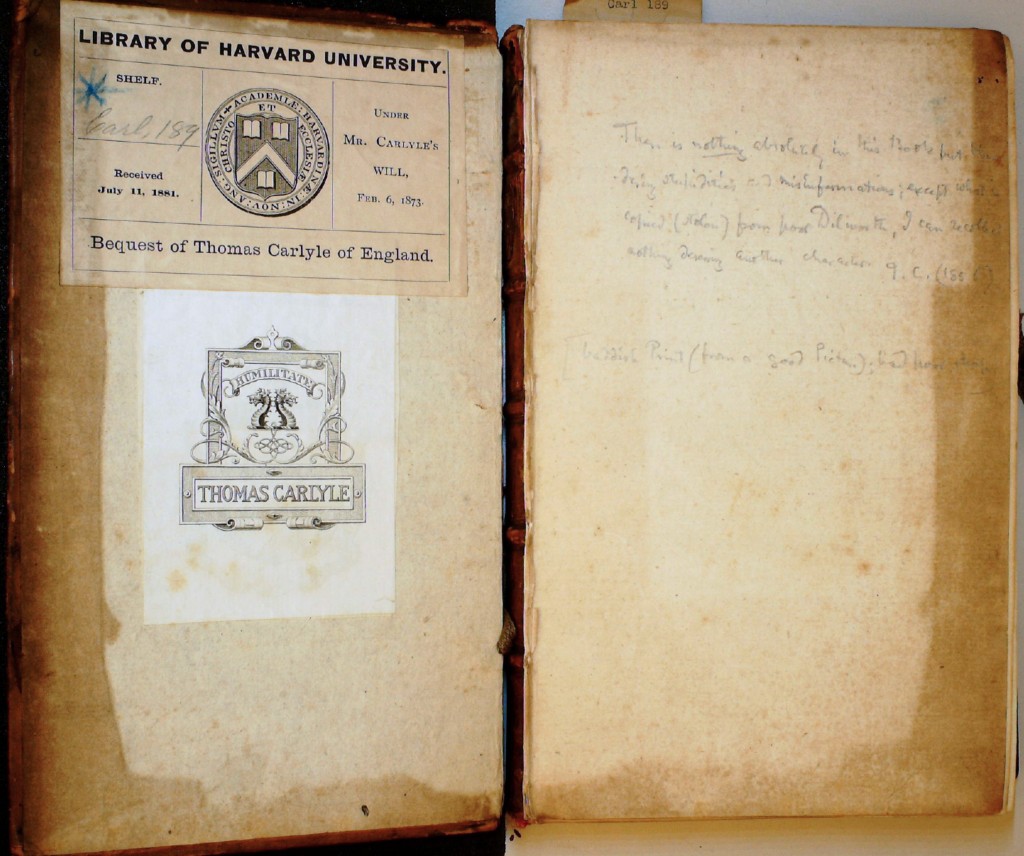 Upon the death of the Scottish philosopher, novelist, historian, and mathematician Thomas Carlyle in 1881, a portion of his personal library was left to Harvard – the only public bequeathal in Carlyle’s will. The annual report of the President and Treasurer of Harvard College for that year quotes the relevant passage, which reads in part:
Upon the death of the Scottish philosopher, novelist, historian, and mathematician Thomas Carlyle in 1881, a portion of his personal library was left to Harvard – the only public bequeathal in Carlyle’s will. The annual report of the President and Treasurer of Harvard College for that year quotes the relevant passage, which reads in part:
…I do therefore hereby bequeath the books (whatever of them I could not borrow, but had to buy and gather; that is, in general whatever of them are still here) which I used in writing on Cromwell and Friedrich, and which shall be accurately searched for and parted from my other books, to the President and Fellows of Harvard College, City of Cambridge, State of Massachusetts, as a poor testimony of my respect for that alma mater of so many of my Trans-Atlantic friends, and a token of the feelings above indicated towards the Great Country of which Harvard is the Chief School.
As the will explains, Harvard was in receipt of only the books Carlyle acquired for research for his Oliver Cromwell’s Letters and Speeches, and his History of Friedrich II of Prussia. Carlyle popularized the “Great Man theory”, a 19th-century belief that the lives and actions of the eponymous great men are the principal shapers of history; and it was under that belief that he wrote on the lives of Cromwell and Frederick the Great. Carlyle’s books would later be transferred to Houghton Library, where they reside today. Work was recently undertaken to enhance the cataloging of these volumes and to better describe their provenance, prompting a new look at a long-standing collection.
“A certain symbolical value the bequest may have, but of intrinsic value as a collection of old books it can pretend to very little,” Carlyle claimed in his will. To a modern reader, however, the research value of the books has little to do with their rarity, and everything to do with Carlyle’s extensive annotations, which give us a portrait of a rigorous, cantankerous, and highly opinionated reader in active conversation with his texts. The example pictured here, from a 1758 biography of Frederick II’s grandfather, Frederick I, reads as follows:
There is nothing absolutely in this Book but blundering stupidities and misinformations; except what is copied (stolen) from poor Dilworth, I can recollect nothing deserving another character. T.C. (1858)
Such vehement disagreements pepper the margins of many of these volumes. At other times these annotations, too voluminous for endpapers and margins, are pasted in on sheets and scraps of paper, or tucked into envelopes. Part of the enhancement work done on these catalog records was to identify volumes with these annotations and inserted manuscript notes, and to provide reference images, particularly of the manuscript material, as part of the Scanning Key Content project. An example of the results may be seen here: http://id.lib.harvard.edu/aleph/006108565/catalog
Carlyle collection: Carl 3 – Carl 288
Thanks to rare book cataloger Ryan Wheeler for contributing this post.

